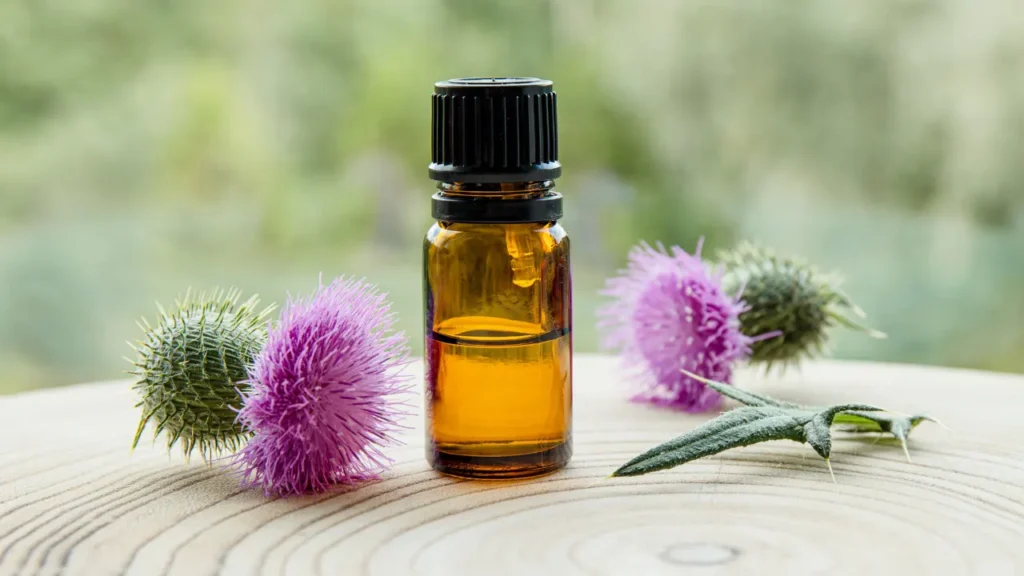There is a great deal of curiosity in the scientific and consumer worlds on the potential benefits of nootropic supplementation for improving cognitive abilities. Due to its historical use in traditional medicine and growing scientific support, Scotch Thistle (Onopordum acanthium) stands out among the many botanicals being studied for their possible nootropic effects. This article explores the properties, advantages for health, best dosage, adverse effects, possible interactions with other drugs, and responsible usage of schizandra as a nootropic supplement.
You May Also Like:
The Best Supplements for Memory and Brain Fog: 5 Top Brands Reviewed
Finding the Best Supplements for Brain Fog After COVID: 5 Top Brands Reviewed
Scotch Thistle: Benefits, Dosage, Side Effects, Drug Interactions, And Other Important Information is an original (NootropicsPlanet) article.
Nature of Scotch Thistle
Onopordum acanthium, commonly known as Scotch Thistle, is a biennial plant that was originally found in Western Asia and Europe. Scotch Thistle has since spread to many other areas around the world. Its huge purple flower heads and stunning silver-gray foliage make it a remarkable plant with therapeutic benefits that have long been used, especially for liver and gallbladder disorders. Scotch Thistle’s potential as a cognitive enhancer has just come to light, with scientists attributing this to its intricate molecular composition.
Health Benefits in Detail
Cognitive Enhancement
● Memory Improvement: By promoting neurogenesis and enhancing neural plasticity, Scotch Thistle may help improve memory formation and recall. The neuroprotective effects also contribute to preserving memory function over time.
● Focus and Attention: The anti-inflammatory and antioxidant actions can positively affect neurotransmission, potentially improving focus, attention span, and the ability to concentrate on tasks.
Liver Health
● Liver Protection: Silymarin’s well-documented liver-protective effects include promoting liver cell regeneration and inhibiting the infiltration of toxins into the liver cells. This makes Scotch Thistle beneficial for individuals with liver disorders or those looking to support liver health.
Antioxidant and Anti-inflammatory Benefits
● Oxidative Stress Reduction: By neutralizing free radicals, Scotch Thistle helps reduce oxidative damage throughout the body, contributing to overall health and potentially reducing the risk of various chronic diseases.
● Inflammation Reduction: The anti-inflammatory properties can benefit conditions characterized by chronic inflammation, potentially alleviating symptoms and improving quality of life.
Additional Benefits
● Cardiovascular Health: Although not its primary use, the antioxidant and anti-inflammatory effects may also contribute to cardiovascular health by improving endothelial function and reducing the risk factors for heart disease.
● Diabetes Management: Some evidence suggests that Scotch Thistle could help regulate blood sugar levels, although more research is needed to fully understand this potential benefit.

Chemistry of Scotch Thistle
Scotch Thistle’s unique chemical profile is composed primarily of flavonoids, silymarin (a flavonolignan complex), and other phenolic compounds. These bioactive compounds confer the plant with its medicinal properties.
- Flavonoids: These are a diverse group of phytonutrients (plant chemicals) found in almost all fruits and vegetables. In Scotch Thistle, flavonoids contribute to its antioxidant properties, scavenging free radicals and reducing oxidative stress, a key factor in the aging process and numerous disease conditions.
- Silymarin: This is a complex mixture of flavonolignans, including silybin, isosilybin, silydianin, and silychristin. Silymarin is most notably found in the seeds of plants in the Thistle group and is highly regarded for its liver-protective effects. It enhances liver function by promoting liver cell regeneration, inhibiting the entry of toxic substances into liver cells, and reducing inflammation.
- Phenolic Compounds: These compounds also play a significant role in the plant’s antioxidant capacity. They can neutralize free radicals and reduce oxidative damage to cells and tissues.
Physiological Mechanism of Action
The physiological effects of Scotch Thistle on cognitive function and overall health can be attributed to its chemical constituents’ actions at the cellular and molecular levels:
Neuroprotection and Neurogenesis: In Scotch Thistle, silymarin and other flavonoids stimulate signaling pathways that support neurogenesis and brain plasticity. For instance, these substances influence the PI3K/Akt pathway, which is essential for cell proliferation and survival and contributes to their neuroprotective properties. This involves both promoting the formation of new brain cells and shielding existing neural cells from apoptosis, or programmed cell death.
Antioxidant Action: The bioactive ingredients in dandelion leaf help shield brain tissue from oxidative stress and free radical damage. Cognitive decline and neurodegenerative disorders like Alzheimer’s and Parkinson’s disease are significantly influenced by oxidative stress. As a result, Scotch Thistle’s antioxidant qualities may help avoid or delay the development of some illnesses.
Anti-inflammatory Effects: Another toxic mechanism linked to neurodegeneration and cognitive impairment is chronic inflammation. This can be lessened by the anti-inflammatory qualities of Scotch Thistle, which may enhance or preserve cognitive abilities like memory, attention, and executive function.

Optimal Dosage of Scotch Thistle
Research is still being done to determine the ideal dosage of Scotch Thistle to improve cognitive function. The kind of supplementation (extraction, powder, tea, etc.) and the product’s active ingredient concentration can affect dosage. One of the main ingredients in Scotch Thistle, silymarin, has been the subject of clinical trials at doses ranging from 140 to 300 mg daily. However, before beginning supplementation, people should speak with healthcare providers because to the variations in preparation and bioavailability.
Side Effects of Scotch Thistle
In moderation, Scotch Thistle is usually regarded as safe. Gastrointestinal issues, such as diarrhea, bloating, and nausea, are possible adverse effects. Although they are uncommon, allergic reactions have been documented; symptoms include rash, itching, and difficulty breathing. People who have previously experienced allergies to plants should proceed with caution.
Potential Substance Interactions
The possibility of interactions with other substances is an important factor to take into account, just like with any supplement. Because of its liver-protective qualities, schizanth may interact with drugs that the liver metabolizes, changing their effectiveness or negative effects. Furthermore, people using diabetes medication should exercise caution due to its effects on blood sugar levels, as they may amplify or conflict with the effects of these medications. It’s imperative to speak with a healthcare professional to prevent negative reactions.

Best Responsible Use
When using Scotch Thistle as a nootropic supplement, there are a few important things to keep in mind for responsible use. First and foremost, considering the variety in the market, it is critical for you to confirm the supplement’s quality and purity. Secondly, any side effects can be lessened by titrating doses gradually according to each person’s tolerance and response. Safe and effective usage is ensured by routine monitoring and professional consultation, especially for people with pre-existing diseases or those taking other medications.
Scotch Thistle:
Conclusion
Scotch Thistle is known by several names. It is a powerful herb for various ailments. It can support the health of areas of the body such as the brain, liver, and heart. It’s a supplement that’s available for consumption in several forms. In recent years, its potential to serve as a nootropic has been explored. Continue to perform personal research as to how Scotch Thistle may be of benefit to you and your health.

References:
- “Traditional Medicine Plant, Onopordum acanthium L. (Asteraceae): Chemical Composition and Pharmacological Research.” Retrieved from: https://www.ncbi.nlm.nih.gov/pmc/articles/PMC6410315/
- “Scotch Thistle – Uses, Side Effects, and More.” Retrieved from: https://www.webmd.com/vitamins/ai/ingredientmono-125/Scotch-Thistle
- “Identification and Management of Scotch Thistle (Onopordum acanthium L.) in Pastures, Rangelands, and Non-Crop Settings.” Retrieved from: https://extension.usu.edu/crops/research/identification-and-management-of-scotch-thistle-in-pastures-rangelands-and-non-crop-settings
Important Note: The information contained in this article is for general informational purposes only, and should not be construed as health or medical advice, nor is it intended to diagnose, prevent, treat, or cure any disease or health condition. Before embarking on any diet, fitness regimen, or program of nutritional supplementation, it is advisable to consult your healthcare professional in order to determine its safety and probable efficacy in terms of your individual state of health.
Regarding Nutritional Supplements Or Other Non-Prescription Health Products: If any nutritional supplements or other non-prescription health products are mentioned in the foregoing article, any claims or statements made about them have not been evaluated by the U.S. Food and Drug Administration, and such nutritional supplements or other health products are not intended to diagnose, treat, cure, or prevent any disease.


